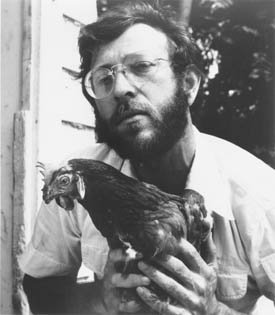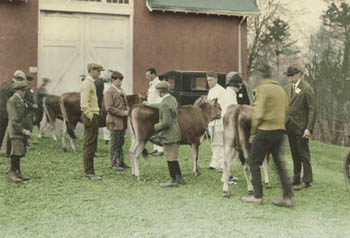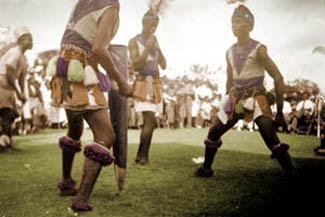Mission
SCUA inspires discovery through the collection and curation of cultural heritage materials for the people of the Commonwealth of Massachusetts and beyond, contributing to the vital conversation between past and future. As part of a community dedicated to the values of diversity, social equity, and positive social change, SCUA acts through its collections, services, programs, and exhibitions to promote free inquiry; the production, exchange, and preservation of knowledge; and joy in learning.
Department history
In 1931, nearly half a century after Librarian Henry Hill Goodell first authorized the permanent retention of the official records of Massachusetts Agricultural College, the Library established a College History Collection. Containing official records of the university’s administrators and faculty and reflecting the life of its students, the College History Collection grew steadily until, in 1953, the Library dedicated a room named in honor of Dean William L. Machmer to serve as the first true home of the University Archives.
Goodell’s foresight in assembling the college archives coincided roughly with the university’s first efforts to build a collection of rare books to support its educational mission. As early as 1868 — just one year after the arrival of the first students — the college accepted the donation of twenty scarce volumes on bee culture from the apiculturist (and state Adjutant General) Henry K. Oliver. By the time the college issued its first library catalog in 1875, rare books were a small but notable part of the collections, closely focused on the primary academic interests of the early college: agriculture, horticulture and botany, and the natural sciences. Among the Library’s earliest acquisitions were the first London edition of William Bartram’s Travels Through North and South Carolina (1792), François Augier de Marigny’s The History of the Arabians (London, 1758), and early bee manuals by John Keys, The Practical Bee-Master (London, 1780) and The Antient Bee-Master’s Farewell (London, 1796) — both courtesy of Oliver. Each of these volumes remains part of the collections today.

David B. Axelrod, ca.1980, Class of 1965, poet, author of The Man who Fell in Love with His Chicken (1980)
From these beginnings, the collection of rare books and manuscripts has co-evolved with the university and its academic programs. In 1973, the acquisition of the records of the Valley Peace Center and the papers of ethnographer Jozef Obrebski marked an expansion of scope into personal papers and organizational records of historical significance beyond the narrow confines of the university, and the arrival of the papers of W. E. B. Du Bois in that same year marked a turning point. The rare book and manuscript collections were merged with the University Archives in the early 1990s to form the Department of Special Collections and University Archives.
SCUA’s initial foray online came with a simple page on the library’s website in 1997; by 2007, under the leadership of Rob Cox, who arrived as head of the department in 2004, it had evolved into the UMarmot project. This was one of the earliest efforts to use freely available software to create a comprehensive online archival catalog. SCUA launched its online digital repository, Credo, in 2011, with the generous support of the Verizon Foundation, the National Endowment for the Humanities, and the National Historic Publications and Records Commission. Available free to all researchers, Credo is now a robust and heavily used presence on the internet, containing hundreds of thousands of pages of content; selections from hundreds of collections; dozens of complete collections, including the papers of W. E. B. Du Bois and Horace Mann Bond; and myriad formats, from textual documents and photographs to audiovisual recordings.
Under Cox’s leadership, the department’s fulltime staff more than doubled, its collections increased fourfold, and its philosophy of collecting and access sharpened. In October 2021, SCUA became the Robert S. Cox Special Collections and University Archives Research Center. Renaming the department for Rob Cox, SCUA’s energetic and influential department head from 2004 until his death in May 2020, and positioning it as a UMass Amherst research center highlighting its social change collections, reflects and extends SCUA’s mission to serve and support researchers, scholars, students, and more.
Mile markers
Each of the library’s million-volume milestones has been celebrated by the addition of a special volume to SCUA’s collections:
- One millionth volume (1971):
- Jonathan Edwards, A careful and strict enquiry into the modern prevailing notions of that freedom of will; which is supposed to be essential to moral agency, vertue and vice, reward and punishment, praise and blame. Boston: S. Kneeland, 1754.
- SCUA’s copy of this classic theological work on Free Will from the New Light minister from Northampton belonged to Rev. John Cleaveland of Ipswich, Mass., one of the subscribers. It is signed and dated by Cleaveland in several locations.
- Two millionth volume (1984):
- Phillis Wheatley, Poems on various subjects, religious and moral. London: A. Bell, 1773.
- A classic of American literature written by a young woman enslaved in Boston, and the first book published by an African-American woman. Gift of Randolph W. Bromery.
- Three millionth volume (2000):
- James Baldwin, Gypsy and other poems, with etched portraits by Leonard Baskin. Northampton, Mass.: Gehenna Press, 1989.
- When Baldwin, a former faculty member at UMass Amherst, died unexpectedly, he was working with the great printer Leonard Baskin on a special volume of unpublished poems. Celebrating SCUA’s strengths in African American history literature and reflecting the fine-printing heritage in Massachusetts, SCUA’s copy includes a signed portfolio of etchings of Baldwin by Baskin, each signed. It is one of fifty copies bound specially by Daniel Gehnrich in leather and paste paper, made by Babette Gehnrich, over boards, and laid into a cloth traycase. Also laid in are Baskin’s proof, 1989, and touched proof, 1989, of two of the portraits. Gift of Lisa Baskin.
- Four millionth volume (2014):
- The proclamation of emancipation of the President of the United States, to take effect January 1st, 1863. Boston: John Murray Forbes, 1862.
- The first separate printing of the Emancipation Proclamation, this volume was printed in miniature so that Union army troops in the south could more easily distribute it.



